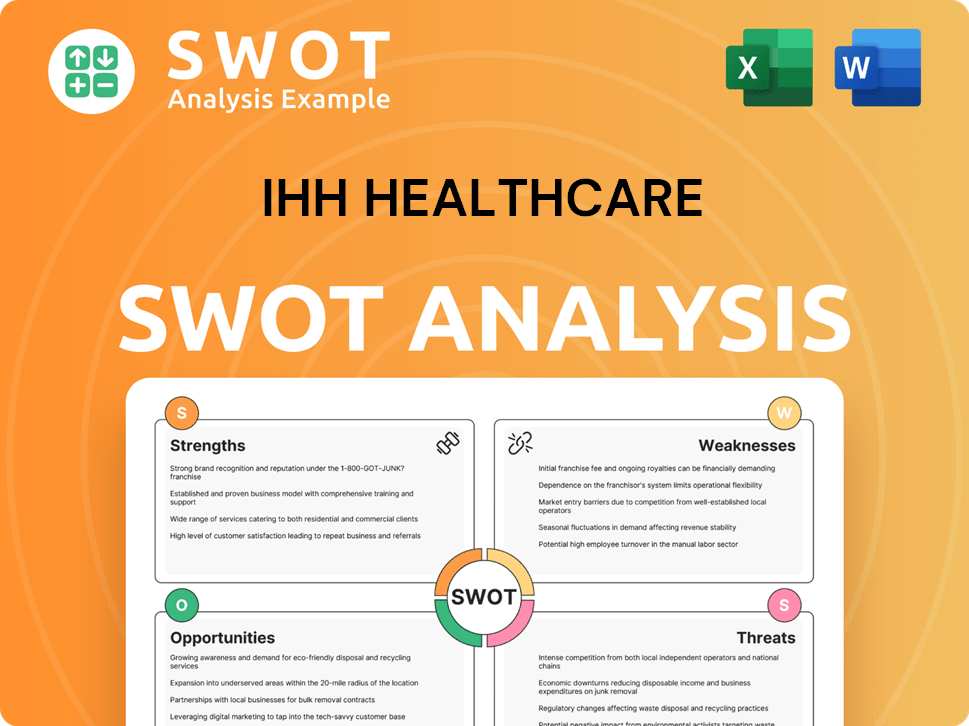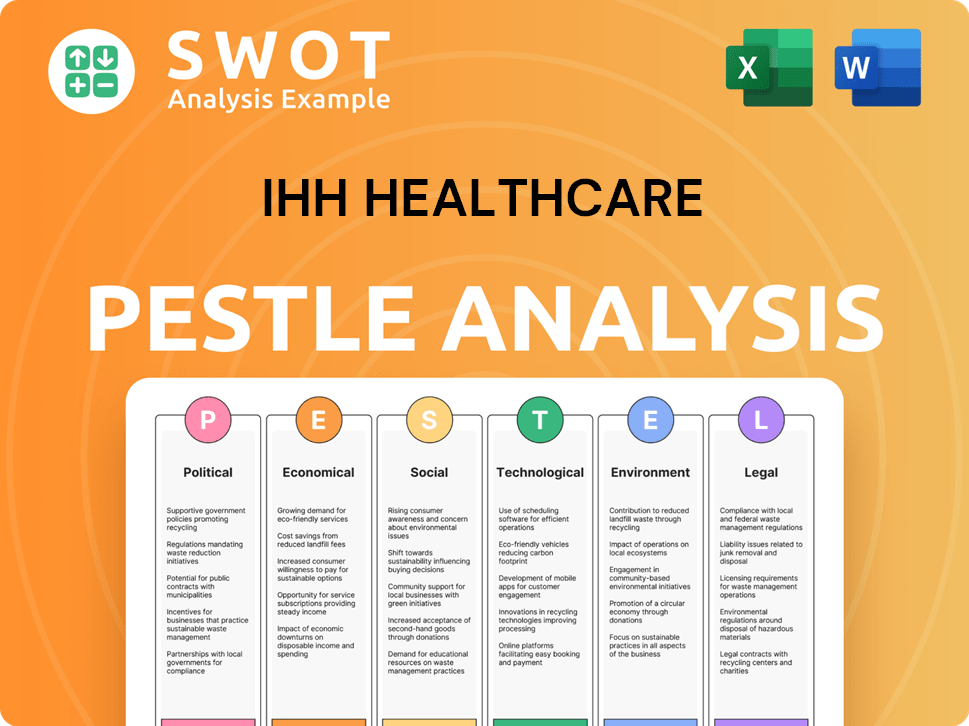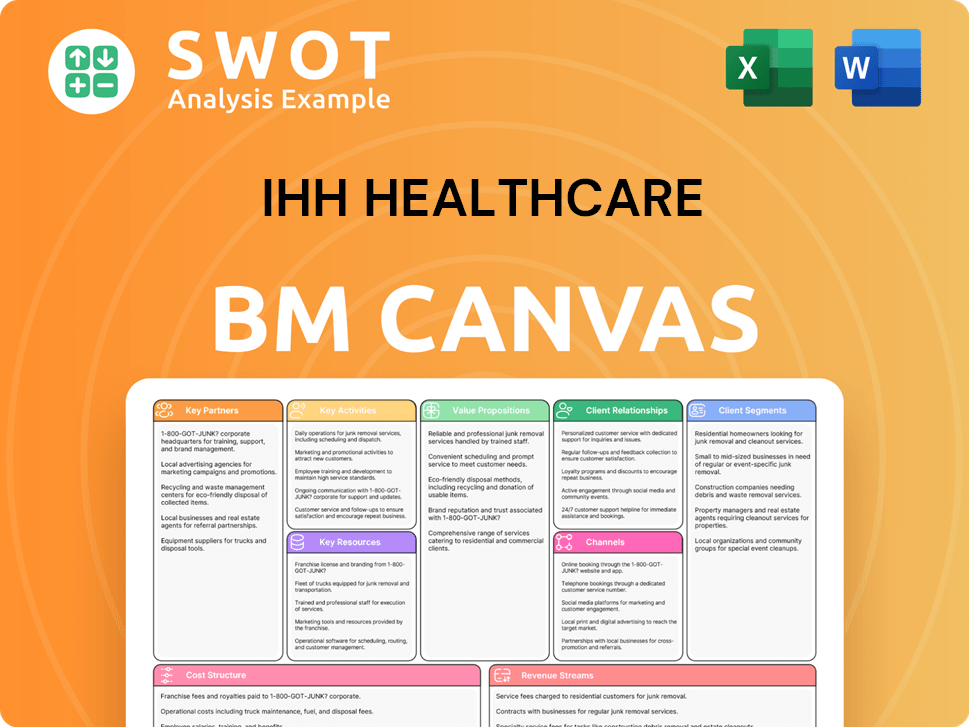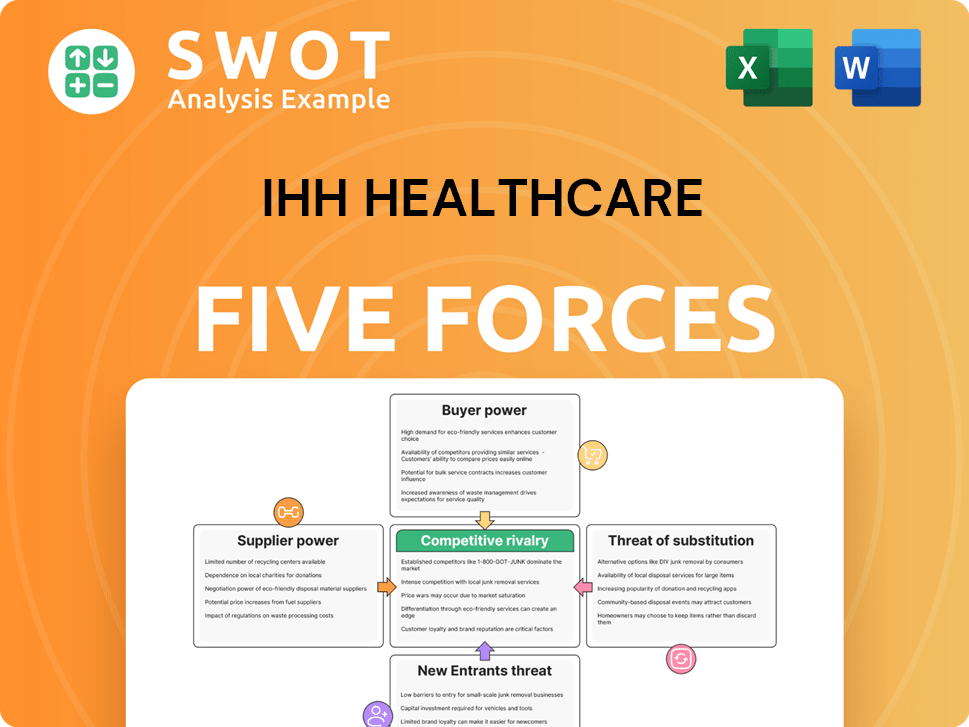IHH Healthcare Bundle
Can IHH Healthcare Continue Its Dominance in the Global Healthcare Market?
IHH Healthcare's recent acquisition of Island Hospital in late 2024 for nearly RM4 billion signals a bold move in its ambitious growth strategy. As a leading healthcare company, IHH Healthcare operates a vast network of hospitals, offering comprehensive medical services across numerous countries. This strategic expansion, coupled with a focus on quality and cost-effectiveness, positions IHH Healthcare for sustained success in the dynamic healthcare industry.

IHH Healthcare's IHH Healthcare SWOT Analysis reveals the company's strengths, weaknesses, opportunities, and threats within the competitive landscape. The future prospects for this healthcare giant are promising, driven by a multi-year transformation initiative focusing on clinical excellence, patient experience, and technological innovation. This strategic approach aims to unlock value, address industry challenges, and drive continued revenue growth through international expansion and strategic initiatives.
How Is IHH Healthcare Expanding Its Reach?
The IHH Healthcare, a leading healthcare company, is actively pursuing aggressive growth strategy through a combination of organic expansion and strategic acquisitions. This approach is designed to capitalize on the increasing demand for high-quality medical services across its key markets. The company's strategic initiatives are geared towards enhancing its market position and driving sustainable growth in the competitive healthcare industry.
IHH Healthcare's expansion plans are ambitious, with a focus on increasing bed capacity and entering new markets. These initiatives are supported by strong financial performance and a commitment to providing excellent patient care services. By focusing on both organic growth and strategic acquisitions, the company aims to solidify its position as a major player in the global healthcare market, creating investment opportunities for stakeholders.
The company is on track to increase its bed capacity by more than 30%, adding close to 4,000 new beds between 2024 and 2028. Approximately 1,000 new beds were already added in FY2024. The expansion is driven by the enduring demand for private healthcare services, an aging population, and the increasing prevalence of non-communicable diseases.
In 2024, IHH Healthcare acquired Timberland Medical Centre in Sarawak and Island Hospital in Penang. The Island Hospital acquisition, completed in November 2024, added a 600-bed facility. This boosted IHH's market share in Penang by patient volume to over 40%. Additionally, in December 2024, Parkway Life REIT, an entity associated with IHH Healthcare, acquired 11 nursing home properties in France.
IHH opened the 127-bed Acibadem Kartal Hospital in Turkey in Q1 2025 and anticipates completing the acquisition of the 228-bedded Shrimann Superspeciality Hospital in India during 2025. In India, IHH plans to add 1,500 beds between FY2025 and FY2028, aiming for a total bed capacity of over 5,000 by the end of FY2024. Malaysia is projected to see an addition of 1,300 new beds, and Europe will add 400 beds by 2028.
IHH is investing in upgrading and future-proofing its hospitals. Mount Elizabeth Orchard Hospital in Singapore is undergoing extensive renovations, with full reopening expected by Q3 2025. Gleneagles Penang is expected to complete its construction by Q1 2025, adding 20-30 beds and a new wing with 22 beds. Pantai Hospital Penang will see a two-phase expansion, increasing bed capacity by 30% in each phase, with the first phase targeted for completion by Q4 2025.
IHH seeks to strengthen its medical tourism contribution, particularly in Malaysia. These initiatives are driven by the enduring demand for private healthcare services, an aging population, and the increasing prevalence of non-communicable diseases. The company's strategic focus includes enhancing patient care services and leveraging digital transformation to improve operational efficiency and patient outcomes.
The acquisitions and expansions are expected to significantly boost IHH's revenue and profitability. The Island Hospital acquisition is expected to generate over RM200 million in synergies within five years. The company's focus on international expansion and strategic acquisitions positions it for continued growth. For a deeper dive into the company's financial model, explore the Revenue Streams & Business Model of IHH Healthcare.
- Increased bed capacity by over 30% between 2024 and 2028.
- Acquisition of key facilities like Island Hospital, adding significant market share.
- Expansion into new markets, including Turkey and India.
- Investment in asset enhancement initiatives to improve existing facilities.
IHH Healthcare SWOT Analysis
- Complete SWOT Breakdown
- Fully Customizable
- Editable in Excel & Word
- Professional Formatting
- Investor-Ready Format

How Does IHH Healthcare Invest in Innovation?
IHH Healthcare is actively deploying innovation and technology to drive its growth strategy and enhance its position within the healthcare industry. The company's focus on digital transformation, cutting-edge technologies, data analytics, and sustainability initiatives underscores its commitment to providing superior medical services. This strategic approach is designed to improve patient care, increase operational efficiency, and create long-term value for stakeholders.
The company's multi-year transformation initiative, guided by its 'ACE' (Align, Challenge, Empower) framework, highlights technology, data, and artificial intelligence as key areas of focus. This integrated approach aims to redefine healthcare standards and meet the evolving needs of patients and the healthcare market. By leveraging these advancements, IHH Healthcare seeks to solidify its competitive advantage and ensure sustainable growth.
IHH Healthcare's strategic initiatives are designed to enhance its growth strategy and future prospects. The company is focused on leveraging technology and innovation to improve patient care and operational efficiency. For more information on the company's core values, see Mission, Vision & Core Values of IHH Healthcare.
IHH is undergoing a digital transformation to increase efficiency, reduce costs, and enhance patient care. This includes automating administrative tasks such as referrals and claims processing. The goal is to free up nurses' time by between 13-21% annually. Cloud-based systems are being implemented for real-time data analytics to optimize resource allocation and improve patient outcomes.
AI-driven imaging solutions have been adopted at Gleneagles Hospital Johor in Malaysia to reduce reporting turnaround time and improve diagnostic accuracy. Gleneagles Singapore has integrated AI-powered mammography analysis. IHH is also expanding its digital app footprint to improve accessibility and convenience for patients.
IHH is at the forefront of adopting advanced medical treatments and technologies. It was the first in Asia to explore Upright Photon Therapy for cancer patients, which is a significant milestone in oncology care. The company is also exploring telemedicine and augmented/virtual reality for clinical training.
IHH is focused on converting data into actionable insights to drive operational and clinical excellence. This includes expanding Clinical Quality Indicators (CQIs), with a target to reach 236 CQIs by 2025. This expansion reflects enhanced capabilities in data collection and analysis, supporting better decision-making.
IHH integrates technology into its sustainability efforts, adopting green energy and waste reduction programs to lower operational costs. Solar panels and reduced anesthetic gas emissions in Malaysian hospitals are examples of these initiatives. A new Global Responsible Sourcing Policy was implemented in 2024, setting expectations for vendors to adopt climate-conscious practices.
Through these initiatives, IHH aims to deliver better, faster, easier, and more accessible care. This aligns with global trends toward value-based healthcare. The company's strategic focus on innovation and technology is designed to improve patient outcomes and enhance its competitive position in the healthcare industry.
IHH Healthcare's strategic investments in technology and innovation offer several advantages, supporting its growth strategy and future prospects. The company's focus on digital transformation, AI integration, and advanced medical technologies positions it well to meet the evolving demands of the healthcare industry. These initiatives are aimed at improving operational efficiency, enhancing patient care, and driving sustainable growth. The expansion of CQIs to 236 by 2025 demonstrates the company's commitment to data-driven decision-making and continuous improvement. By integrating sustainability practices, IHH is also addressing environmental concerns and reducing operational costs, contributing to its long-term viability.
- Enhanced Patient Care: AI-driven solutions and advanced treatments improve diagnostic accuracy and patient outcomes.
- Operational Efficiency: Automation and cloud-based systems streamline processes, reducing costs and freeing up staff time.
- Data-Driven Insights: Expanded CQIs provide valuable data for continuous improvement and informed decision-making.
- Sustainability: Green initiatives reduce environmental impact and lower operational expenses.
- Competitive Advantage: Technological advancements and strategic initiatives strengthen IHH's market position.
IHH Healthcare PESTLE Analysis
- Covers All 6 PESTLE Categories
- No Research Needed – Save Hours of Work
- Built by Experts, Trusted by Consultants
- Instant Download, Ready to Use
- 100% Editable, Fully Customizable

What Is IHH Healthcare’s Growth Forecast?
The financial outlook for IHH Healthcare, a leading healthcare company, appears promising, driven by strategic growth initiatives and sustained demand for medical services. The company's performance in recent years demonstrates its ability to navigate the complexities of the healthcare industry and capitalize on emerging opportunities. This positions IHH Healthcare for continued success in the future.
For the fiscal year ending December 31, 2024, IHH reported a revenue of RM24.4 billion, a 16% increase year-on-year, and an EBITDA of RM5.4 billion, a 17% growth from FY2023. Core net profit grew by 32% to RM1.7 billion in FY2024, excluding exceptional items. These figures underscore the company's strong financial health and its capacity for expansion within the healthcare industry.
Looking ahead, IHH Healthcare's growth strategy focuses on expanding bed capacity and enhancing operational efficiency across its key markets. This strategic approach is expected to drive revenue growth and improve profitability in the coming years. The company's focus on sustainable practices and digital transformation further strengthens its position in the competitive healthcare industry.
Revenue is forecast to increase by 4.2% year-on-year in FY2025, fueled by a 6.8% increase in bed capacity and a 3% higher revenue intensity. This growth is expected to be driven by increased patient volumes and higher revenue per patient. The company's strategic initiatives are designed to support this revenue expansion.
IHH Healthcare is expected to post a 10.4% increase in net profit in FY2025. This growth is primarily driven by the expansion of bed capacity across key markets and improvements in all regions, particularly India and Greater China. The company's focus on operational efficiency contributes to its profit margins.
In Q1 FY2025 (ended March 31, 2025), IHH's net profit dropped to RM514 million. However, revenue grew by 5.7% to RM6.29 billion, driven by sustained demand and price adjustments. On a constant currency basis, Q1 2025 revenue grew 17% year-on-year and EBITDA increased 8% year-on-year, reflecting strong operational resilience.
Analyst forecasts project IHH's revenue to hit MYR26.9 billion (up 10.3% YoY) and EBITDA at MYR6.0 billion (up 9.9% YoY) for the full year 2025. The company expects the second half of 2025 to exhibit stronger performance, particularly with the full reopening of Mount Elizabeth Orchard Hospital in Q3 2025.
IHH is committed to prudent capital management, with facility enhancements and bed additions primarily funded through operating cash flow. The company's financial strategy supports its growth ambitions while maintaining financial stability. This approach ensures sustainable growth.
To support its Malaysian growth ambitions, IHH successfully issued an inaugural RM4 billion unrated Sukuk in November 2024. The company also secured its first S$300 million sustainability-linked loan in April 2025. These financial instruments support the company's expansion plans.
Net gearing is projected to fall from 33.9% in 2024 to 8.4% by 2027, reflecting stronger cash flows and deleveraging. This improvement in financial leverage indicates a strengthening of the company's financial position and its ability to manage debt effectively. This will help to improve the IHH Healthcare's future prospects.
The strong performance in Q1 2025, despite certain challenges, highlights the company's operational resilience. This resilience is a key factor in IHH Healthcare's ability to navigate market fluctuations and maintain its growth trajectory. This will help to improve the IHH Healthcare's future prospects.
IHH Healthcare's strategic initiatives, including the expansion of bed capacity and the integration of new acquisitions, are designed to drive long-term growth. These initiatives are supported by prudent financial management and a focus on patient care. These initiatives will drive the IHH Healthcare's future prospects.
The company's expansion plans, particularly in India and Greater China, are expected to contribute significantly to its future revenue growth. These markets offer substantial opportunities for IHH Healthcare to increase its market share. This will help to improve the IHH Healthcare's future prospects.
IHH Healthcare Business Model Canvas
- Complete 9-Block Business Model Canvas
- Effortlessly Communicate Your Business Strategy
- Investor-Ready BMC Format
- 100% Editable and Customizable
- Clear and Structured Layout

What Risks Could Slow IHH Healthcare’s Growth?
The Owners & Shareholders of IHH Healthcare face a complex landscape of potential risks and obstacles that could influence the company's future. While IHH Healthcare's growth strategy has been successful, several factors could impede its progress. Understanding these challenges is crucial for evaluating the company's long-term viability and investment potential within the healthcare industry.
These risks span various areas, from market competition and rising costs to regulatory changes and technological disruptions. Effective risk management is essential for IHH Healthcare to maintain its competitive edge and achieve its strategic goals. The company's ability to navigate these challenges will be a key determinant of its future success and its ability to capitalize on future prospects.
IHH Healthcare's strategic initiatives are designed to mitigate these risks, but the dynamic nature of the healthcare sector requires continuous adaptation and proactive measures. The company must remain agile and responsive to market changes to ensure sustainable growth and profitability.
The healthcare sector is becoming increasingly competitive. Both established players and new entrants are vying for market share. This competition can lead to pressure on pricing and margins for IHH Healthcare.
Escalating healthcare costs globally can strain patient affordability and healthcare budgets. This can impact IHH's patient volume and profitability. Industry-wide challenges include rising cost pressures.
Evolving government regulations regarding healthcare pricing, insurance coverage, and medical technology adoption can affect IHH's operational costs and profit margins. Payor pressures from public and private insurers shape reimbursement dynamics.
Rapid technological advancements pose a risk of disruption if the company fails to adapt quickly or invest sufficiently in new innovations. IHH Healthcare must stay at the forefront of technological advancements.
Economic recessions can lead to reduced patient spending on non-essential healthcare services, impacting revenue streams. Despite global economic and geopolitical headwinds, IHH remains well-positioned.
Competition for skilled healthcare professionals is fierce globally. Attracting and retaining top talent is crucial for IHH to maintain its service quality. This is a constant challenge in the industry.
Fluctuations in exchange rates, particularly the Singapore dollar versus the Malaysian Ringgit and the Turkish Lira, can affect reported revenue and profitability. These fluctuations can impact financial performance. The company must manage these risks effectively.
Renovations and upgrades, such as those at Mount Elizabeth Orchard Hospital in Singapore, can lead to temporary bed closures and impact inpatient admissions. These disruptions can affect revenue streams. IHH Healthcare plans these carefully.
IHH Healthcare Porter's Five Forces Analysis
- Covers All 5 Competitive Forces in Detail
- Structured for Consultants, Students, and Founders
- 100% Editable in Microsoft Word & Excel
- Instant Digital Download – Use Immediately
- Compatible with Mac & PC – Fully Unlocked

Related Blogs
- What are Mission Vision & Core Values of IHH Healthcare Company?
- What is Competitive Landscape of IHH Healthcare Company?
- How Does IHH Healthcare Company Work?
- What is Sales and Marketing Strategy of IHH Healthcare Company?
- What is Brief History of IHH Healthcare Company?
- Who Owns IHH Healthcare Company?
- What is Customer Demographics and Target Market of IHH Healthcare Company?
Disclaimer
All information, articles, and product details provided on this website are for general informational and educational purposes only. We do not claim any ownership over, nor do we intend to infringe upon, any trademarks, copyrights, logos, brand names, or other intellectual property mentioned or depicted on this site. Such intellectual property remains the property of its respective owners, and any references here are made solely for identification or informational purposes, without implying any affiliation, endorsement, or partnership.
We make no representations or warranties, express or implied, regarding the accuracy, completeness, or suitability of any content or products presented. Nothing on this website should be construed as legal, tax, investment, financial, medical, or other professional advice. In addition, no part of this site—including articles or product references—constitutes a solicitation, recommendation, endorsement, advertisement, or offer to buy or sell any securities, franchises, or other financial instruments, particularly in jurisdictions where such activity would be unlawful.
All content is of a general nature and may not address the specific circumstances of any individual or entity. It is not a substitute for professional advice or services. Any actions you take based on the information provided here are strictly at your own risk. You accept full responsibility for any decisions or outcomes arising from your use of this website and agree to release us from any liability in connection with your use of, or reliance upon, the content or products found herein.